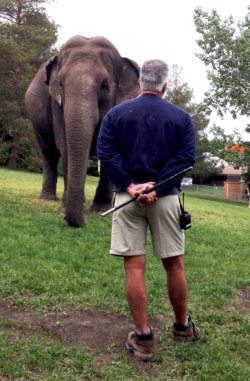I ask upon what pinnacle do we base human life and well-being that denies all rights whatsoever to every species but our own? … Those who refuse to help erect the milestones are not on the march. – Lord (Douglas) Houghton (1898-1996)
Today is a momentous day for elephants that many of us in the elephant advocacy community have ardently awaited. The Nonhuman Rights Project is filing its elephant rights lawsuit on behalf of their clients, Asian elephants Beulah and Minnie and African elephant Karen. The NhRP’s lawsuit is groundbreaking in that it seeks to establish the recognition and protection of common law rights for these species.
There is another female Asian elephant well known to elephant advocates – solitary Lucy in Canada. Lucy is estimated to be 42 years old, was wild-born in Sri Lanka, orphaned and purchased by the Edmonton Valley Zoo at the tender age of two. She remains there to this day despite a 12-year campaign to free her to a US sanctuary. Lucy’s not only isolated from her own kind, but also endures Edmonton’s frigid, snowy and inappropriate winter climate. Lucy is the northernmost elephant in North America. Her plight has captured the attention and hearts of people around the world, over 13,000 of whom follow and participate in her ongoing campaign via our Facebook page, Friends of Lucy.
My colleagues and I at Friends of Lucy unequivocally and wholeheartedly support the NhRP’s legal work on behalf of elephants. We believe their lawsuit filed today is one of the most exciting and promising developments for elephants in our lifetimes.
We and our colleagues at Zoocheck and Voice for Animals Society – Edmonton, who initiated Lucy’s campaign in 2005, know all too well the difficulty and frustration of waging long-term campaigns to secure the release of captive elephants like Lucy to reputable sanctuaries.

One of the reasons for the length of Lucy’s campaign is that, just as in the US, here in Canada the law regards elephants and all nonhuman animals as property, with no legal rights of their own. In both countries, the scales of justice are heavily weighted towards elephants’ captors, not the elephants.
The NhRP’s legal victory, which we believe will prevail, will not alter Canadian law but it will provide a legal precedent that can help change attitudes here towards elephants and could potentially influence Canadian law and policy if and when organizations here follow the lead of the NhRP in seeking legal recognition of elephants’ nonhuman rights.
We’ve followed and worked on many other elephant advocacy campaigns in addition to Lucy’s, and it’s clear to us as experienced advocates that current law has failed elephants in both countries. Existing state, provincial and federal animal cruelty laws and regulations in the US and Canada are weak and often unenforced, and it can take animal protection organizations years of litigation to obtain standing and relief for elephants, if they ever do. The legal status quo has resulted in the vast majority of captive elephants suffering in distressing, inhumane and injurious conditions for years or decades, often never to be released from their bondage except through death.
The law has not kept pace with science. Decades of research have enlightened us about elephants in the wild as well as in captivity. Confinement is stressful and injurious to elephants’ physical, psychological and emotional health and well-being. In the NhRP’s groundbreaking lawsuit, esteemed elephant researchers including Drs. Joyce Poole and Cynthia Moss provide the scientific foundation, and the NhRP provides the legal arguments to establish common law rights for elephants. What we can contribute is our support and perspective.
As Drs. Poole and Moss have documented over many years of observation, elephants’ lives in the wild are rich in emotional, mental, social and ecological complexity—robust and full.
Elephants’ actions display forethought; they demonstrate self-awareness; they communicate by visual, acoustic, tactile, chemical, and seismic means; and like us, they mourn their dead. Elephants have lived, reproduced and thrived for millions of years – until humans began hunting and poaching them en masse, and zoos and circuses began uprooting them from the wild in the late 1800s and early 1900s, preventing them from exercising free will and determining the course of their own lives. That autonomy is a vital part of being an elephant.

It is ignoble and unjust of the human race to impose what amounts to life sentences of incarceration on these nonhuman beings who possess advanced cognitive abilities, self-awareness, empathy and altruism, the capacity for grief, and autonomy. Given the scientific discoveries of the past four decades and the body of work published by researchers, there can be no justification for depriving elephants of their liberty for human entertainment or profit through captivity.
The “ownership,” incarceration and exhibition of elephants like Beulah, Minnie and Karen, and like Lucy, in our view is inherently degrading and cruel. We believe it also results in the public perception of elephants as objects, not the autonomous beings they are. Elephants aren’t “things.” They’re not inanimate objects, biomachines, props for selfies, or clowns to amuse us. They’re their own beings with their own minds, communication, desires, choices, history, futures – and innate rights we have so far failed to recognize.
Current US and Canadian law don’t reflect an understanding of, or respect for, the advanced minds behind the great grey visages of elephants. The science, as well as the moral imperative, is immutable. It is time for their legal status to change to reflect our knowledge of this species.
All of these elephants – Beulah, Karen, Minnie, Lucy, and hundreds more in other captive facilities – are held against their will, with no just cause (including the false claim of conservation of their species). Just human “ownership,” domination and subjugation until the elephants die. When animal activist and celebrity Bob Barker testified to the US Congress on behalf of circus elephants in 2011, he stated “that day that they die is probably the best day of their lives.”
A writ of habeas corpus can free humans who are illegally detained or incarcerated. So, too, can it – and should it – free elephants from their unjustifiable bondage. Bodily liberty and bodily integrity are no small things to an elephant – they’re everything. While elephants who have lived in captivity cannot be released back to the wild for lack of familial herds and survival skills, sanctuaries exist to provide them with the closest to the natural lives their kin in the wild enjoy.
Sanctuary restores autonomy and wholeness to elephants by enabling them to return to a natural state of being. They are no longer manipulated, controlled or exploited for human curiosity, amusement or profit. They can simply be elephants again, at one with nature and their own kind, free to graze, browse and swim, dust-bathe and mud-bathe, take a nap or forage all night under the stars if they choose to, and just be. Their lives are their own. Isn’t that, at its core, what all of us want in life? Why would we think that universal need is limited to our own species?
When NhRP’s litigation on behalf of their elephant clients succeeds, there will be people who question or criticize the courts for recognizing and protecting the legal rights of elephants. They’ll wonder how we could accord rights to a species other than our own. It’s not a question of how we can, but knowing what we now know about elephants, a question of how we cannot.
To return to Lucy, on a personal note, my own advocacy for Lucy began in early 2011 when I learned of her existence and captivity in my own native country. A 10-minute video of Lucy uploaded to YouTube in 2010 affected me to my core – to see the tedium of Lucy’s life, her lack of normal elephant behaviors such as ear-flapping and tail-wagging, her stereotypy, and what I felt is her psychological suffering and the emotional and spiritual death of a magnificent being.
Since that day I’ve spent countless hours poring over expert affidavits and reports and carefully studying the photos and videos we’ve posted on our Friends of Lucy social media platforms, and my perception of her situation is unchanged. Though the zoo staff tries harder now to keep Lucy occupied so she doesn’t stereotype, and the Valley Zoo has recently discontinued some demeaning acts we criticized such as forcing Lucy to strike circus-style poses, lift people with her trunk and be ridden by keepers, she’s still isolated from her own species – and the same pall of brokenness is apparent in images of Lucy.
In the long struggle to release elephants from incarceration, as advocates, campaigners and humanitarians we welcome the potential for US law, and the courts that adjudicate the law, to be the true and lasting protectors of elephants.
We can no longer ignore, or plead ignorance to, the terrible cruelty and lifelong suffering we impose on captive elephants, and we must take action now to remedy it – starting with recognizing elephants’ legal rights as self-aware, intelligent, autonomous and sentient beings. We believe this lawsuit on their behalf by the NhRP is a critical step in that direction.